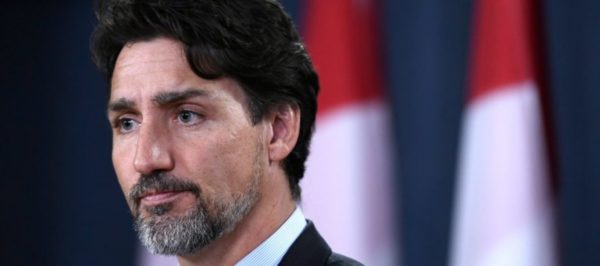
CPC leads in vote intention, Liberal Party down seven points
March 4, 2020 – Prime Minister Justin Trudeau and his minority Liberal government are bearing the scars of what has been a most bruising start to a federal government’s year.
While the first 60 days of 2019 were defined by a political scandal, the beginning of 2020 has been marked by events at home and abroad that have demanded deft and adroit response.
Unfortunately for Trudeau, the latest public opinion data from the Angus Reid Institute finds the PM’s performance has been lacking in recent weeks, particularly on the energy and climate change front, and this has had a negative impact on his approval numbers.
The most recent quarterly survey of more than 5000 adults shows the improved view of him in the wake of the devastating Iran plane crash that killed 57 Canadians in January has evaporated, after weeks of conflict and lack of resolution around the Coastal GasLink blockades.
The Prime Minister’s approval rating has dropped 10 points, and now sits at 33 per cent, right around where it was for most of 2019.
More Key Findings: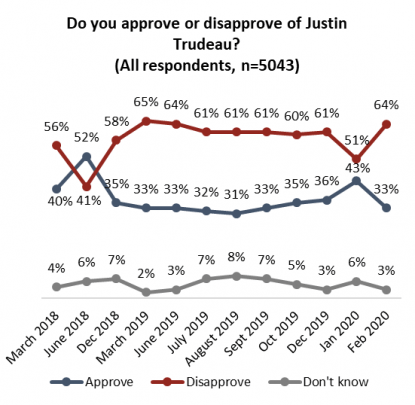
- 34 per cent of Canadians would vote for the Conservative Party of Canada if a new election were held, exactly the proportion of votes that the party received in October, compared to one-quarter (26%) who say they’d vote Liberal
- Trudeau’s approval remains strongest among Canadians under 35 years old. Approval among this group, however, has not held a majority since 2018, and is currently down to 37 per cent
- Each party maintains a significant portion of its voters from 2019. Notably, however, the Liberal Party and Green Party appear to have lost the most support, with one-in-three past voters for each saying they would vote differently now
About ARI
The Angus Reid Institute (ARI) was founded in October 2014 by pollster and sociologist, Dr. Angus Reid. ARI is a national, not-for-profit, non-partisan public opinion research foundation established to advance education by commissioning, conducting and disseminating to the public accessible and impartial statistical data, research and policy analysis on economics, political science, philanthropy, public administration, domestic and international affairs and other socio-economic issues of importance to Canada and its world.
INDEX:
Part 1 – The Canadian Landscape
-
Environment, health care are top issues
-
Economic optimism increasing
-
Half say Canada is on the wrong track
Part 2 – Party Leader Dynamics
-
Trudeau’s approval down 10 points
-
Leader favourability comparison
Part 3 – Vote Intention
-
Significant age and gender divides persist
-
The regional picture
Part 1 – The Canadian Landscape
Environment, health are top issues
Amid nationwide protests over the Coastal Gaslink natural gas pipeline in northern British Columbia and the cancellation of a major oil sands mine in northern Alberta, the issue Canadians care about most continues to be the country’s handling of climate change and the environment. More than one-in-three Canadians (36%) choose that issue as one of their primary national concerns.
Exemplifying the tension in Canada, however, issues related to energy, natural resources and pipelines are also chosen as a top issue by one-quarter of Canadians (23%). Finding the balance between environment and industry also has ramifications for the country’s economy, which is considered to be among the most important issues in Canada by one-in-four (24%).
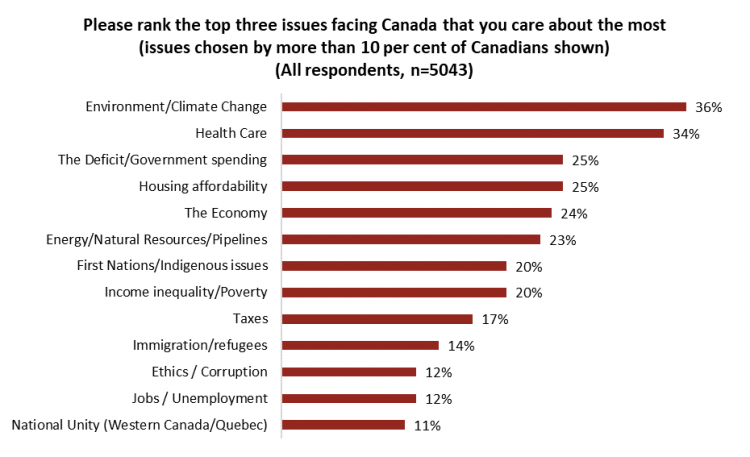
Views of national issues across the country are varied, though there are some notable trends. Health care, for instance, is a top two issue in Ontario, Quebec and Atlantic Canada. Meanwhile, energy and natural resources appear in the top three in all provinces west of Ontario, but none east of Manitoba. Climate change is the most common issue across provinces, appearing in the top three for six of the nine provinces canvassed:
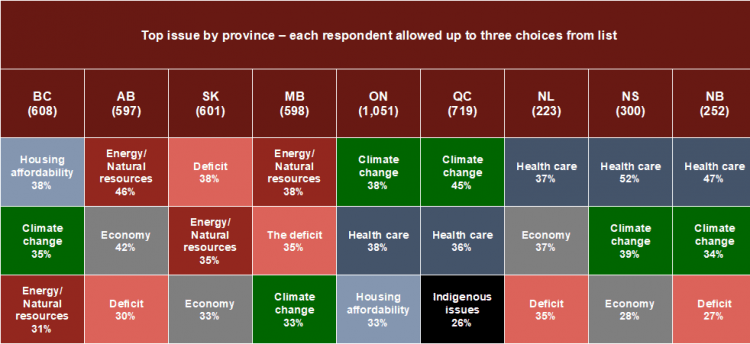
*Because its small population precludes drawing discrete samples over multiple waves, data on this question specific to Prince Edward Island is not released.
Economic optimism increasing
Looking at issues at the individual level, Canadian self-assessments of personal economic circumstances has been steadily rising. The percentage of those saying they are better off now than they were last year at this time has risen to a four-year high, with 23 per cent expressing improvement. Unemployment dropped to 5.5 per cent in January and remains close to the lowest level in 43 years. That said, the number who say they are worse off remains higher, at one-in-three (32%):
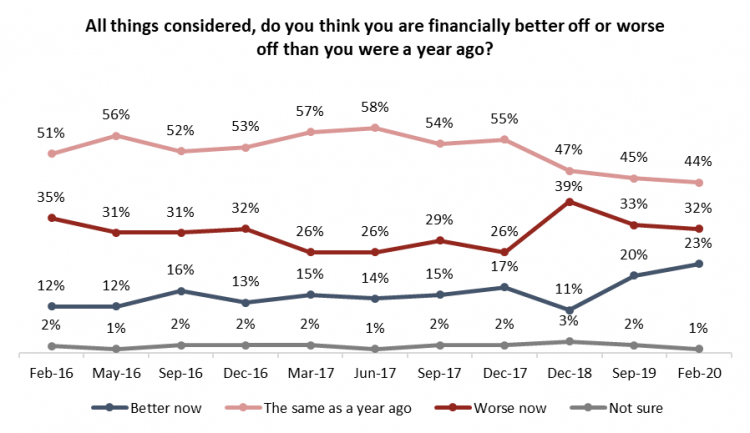
Meanwhile, optimism for the next year is also rising. Three-in-ten Canadians (29%) say they anticipate being better off next year than they are now, seven points higher than those who say they will be worse off.
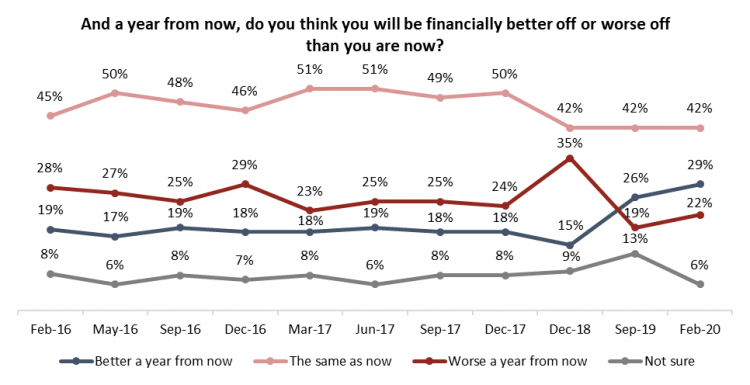
Their personal fortunes do not, however, extend to the Canadian economy as a whole. In the face of considerable uncertainty in the resource sector and the unfolding implications of the coronavirus on global trade and the important travel and tourism sector (responsible for approximately 740,000 jobs in 2019), just 13 per cent of Canadians say they think the economy will improve over the next year. Half (51%) say that it will likely worsen:
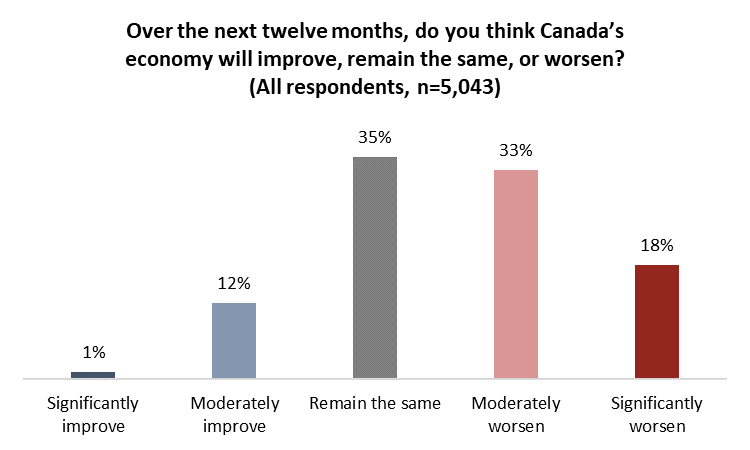
Half say Canada is on the wrong track
Canadians continue to offer skepticism as to the general direction of the country. Asked whether Canada is on the right or wrong track, half say that they feel the latter is the case (52%) while three-in-ten (29%) say the country is moving in the right direction:
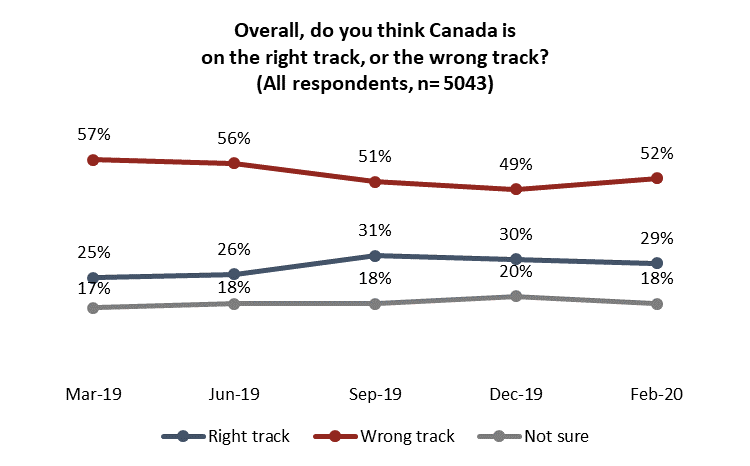
Part 2 – Party Leader Dynamics
Trudeau’s approval down 10 points
The past three months have been a whirlwind for the federal government. It has attempted to deal with enormous international issues such as the fallout of the Iran plane crash that killed 57 Canadians on board, the spread of the coronavirus, and a strained relationship with China, to say nothing of crises at home such as Teck Resources’ withdrawal of its proposed $20 billion dollar mine in northern Alberta, and protesters across the country who shut down railways, bridges and other infrastructure in opposition to the Coastal Gaslink natural gas pipeline in northern B.C.
While Justin Trudeau’s handling of the Iran plane crash was largely praised by Canadians, and led to a boost in his approval to 43 per cent, that positive momentum has been lost as Canadians have been critical of his handling of the Coastal GasLink blockades. 70 per cent of Canadians say Trudeau has done a poor job on that issue, and his approval this quarter is down 10 points, to 33 per cent:
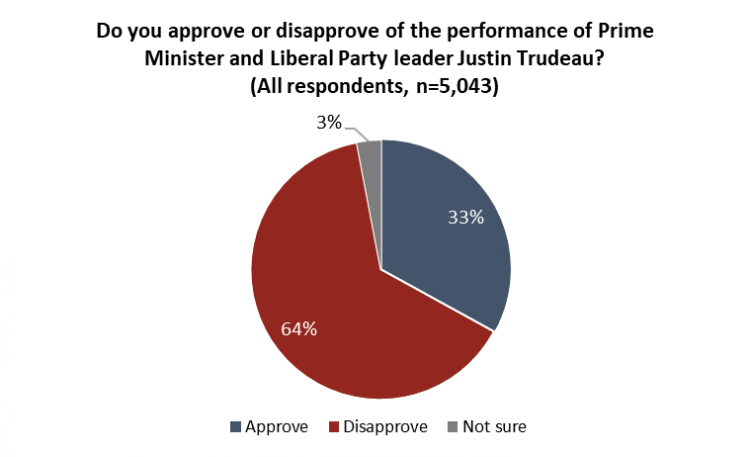
Trudeau’s approval is now back to where it was for most of 2019:
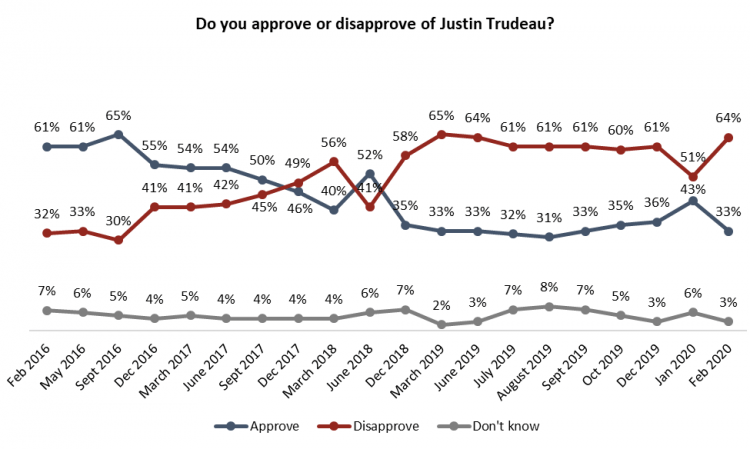
Justin Trudeau’s approval is higher in Ontario, Quebec and Atlantic Canada. His disapproval reaches 80 per cent in Alberta and Saskatchewan.
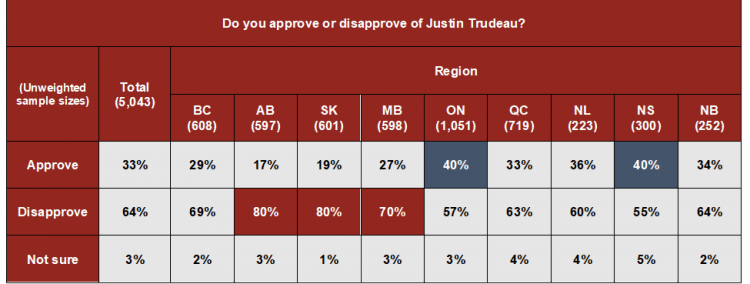
*Because its small population precludes drawing discrete samples over multiple waves, data on Prince Edward Island is not released.
Consistent with the Angus Reid Institute’s polling conducted throughout his tenure, Trudeau’s approval remains strongest among Canadians under 35 years old. Approval among this group, however, has not held a majority since 2018, and is currently down to 37 per cent:
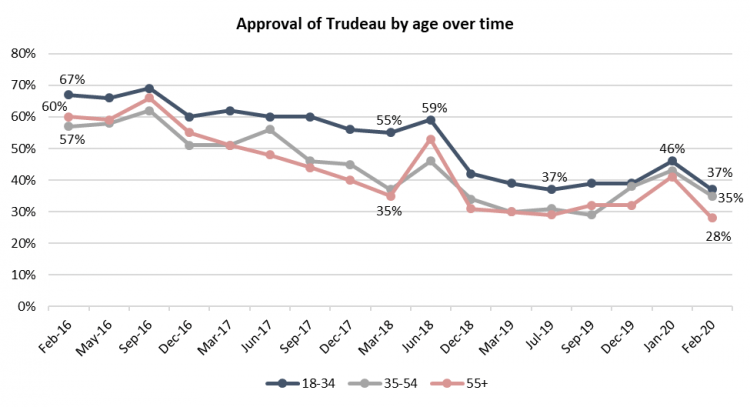
Looking at age and gender in combination reveals a pattern that has consistently affected Trudeau’s approval rating: Men of all ages are more likely than women their age to have negative opinions of the Prime Minister. Indeed, eight-in-ten men ages 55 and above disapprove of Trudeau’s performance thus far, the highest of any age and gender group.
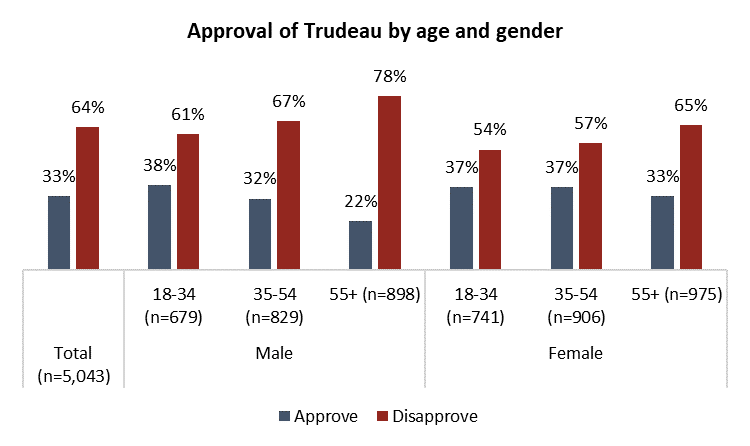
Leader favourability comparison
Asked a similar question on the country’s opposition leaders, outgoing opposition leader Andrew Scheer fares even worse than Trudeau.
Having resigned as CPC leader in December, Scheer is holding his position in the interim as the party undergoes the process of selecting new leadership. He prompts unfavourable views of 65 per cent of Canadians. As for the other leaders, Canadians are more likely to hold favourable than unfavourable views of NDP leader Jagmeet Singh and Bloc Québécois leader Yves-François Blanchet. A majority (65%), however, say they are either not sure or have never heard of Interim Green Party leader Jo-Ann Roberts (see detailed tables).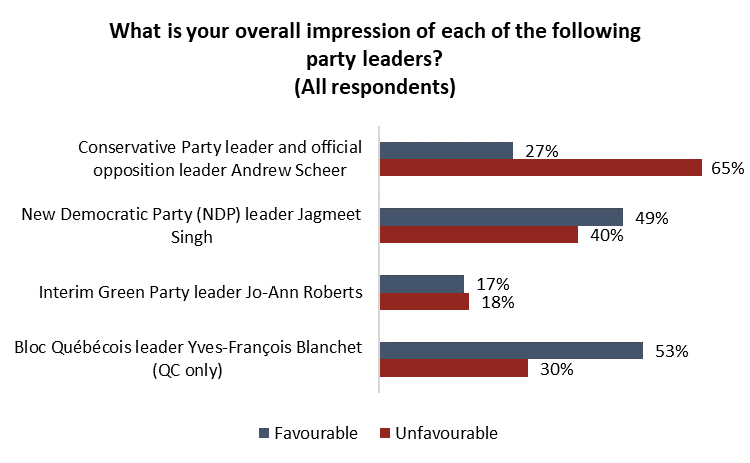
Net favourability scores further reveal the extent of Scheer’s unpopularity, while emphasizing Blanchet’s strong favourability in Quebec:
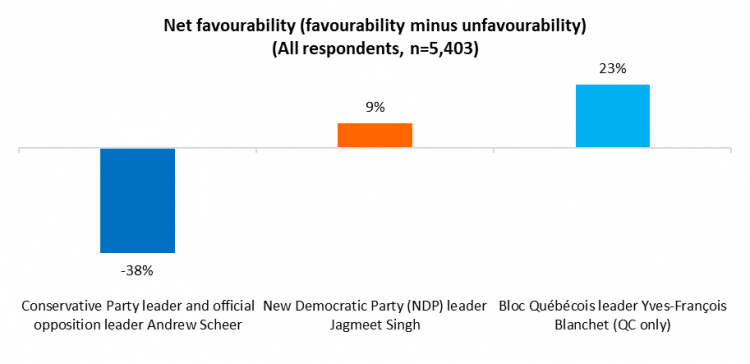
Part 3 – Vote Intention
Against the backdrop of these views of the party leaders is the undercurrent of tension that flows with a minority situation in Parliament. Three main contenders for CPC leadership say if elected to the party’s top spot, they would force an election. If this happened, how would the parties fare?
While current vote intention for the Conservative Party is unchanged, at exactly the 34 per cent that the party received in October, just one-quarter of Canadians (26%) say they would vote for the Liberals if a new election were held. The New Democratic Party has the support of one-in-five (21%) decided and leaning voters.
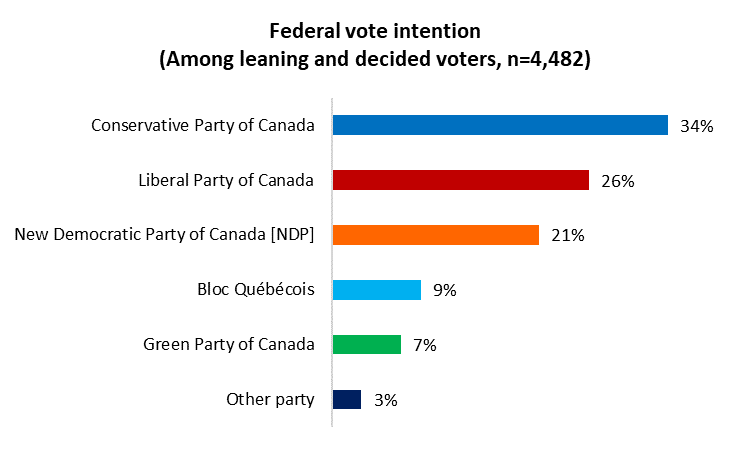
While the Liberal Party’s support held consistently around one-in-three Canadians since last summer, there appears to have been considerable drop for it and a subsequent rise in support for the New Democratic Party:
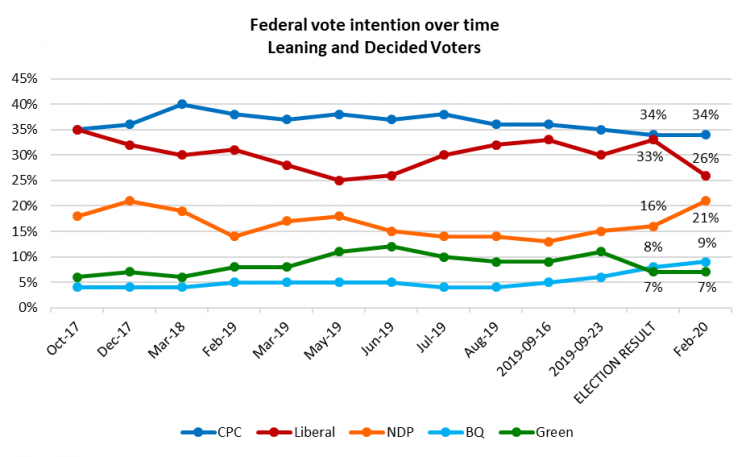
Each party maintains a significant portion of its voters from 2019. Notably, however, the Liberal Party and Green Party appear to have lost the most support, with one-in-three past voters for each saying they would vote differently now.
Fewer than seven-in-ten 2019 Liberal voters say that they’re inclined to vote for the party again today, compared to at least eight-in-ten of those who voted for the CPC, NDP or Bloc Quebecois last October.
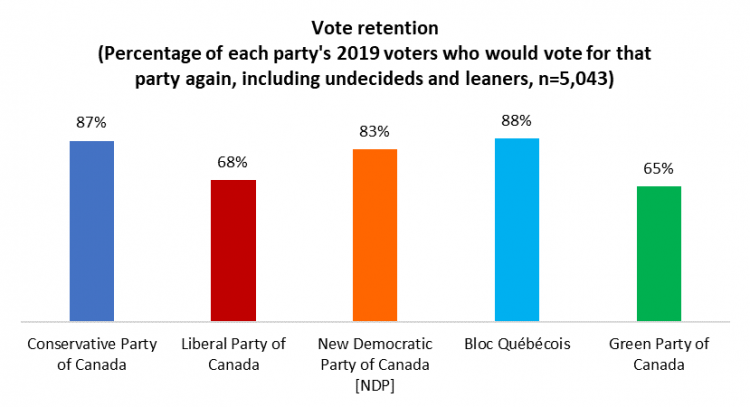
Significant age and gender divides persist
The Conservative Party continues to garner strong support from one of its key voting blocks: male voters. More men in each age group express an intention to vote for the CPC than for any other party, ranging from a six-point lead with 18- to 34-year-olds, to 28 points among those over 55.
The Conservative advantage does not hold among female voters, with support among all female age groups nearly identical with the Liberals. Young women and young men offer considerable support to the NDP as seen in the table below:
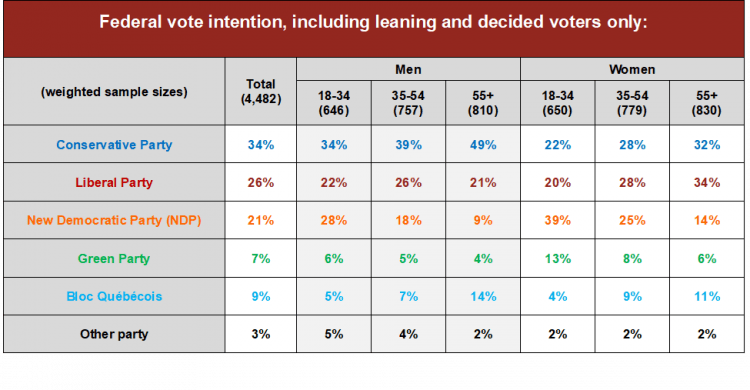
The regional picture
Regionally, the Conservative Party remains relatively uncontested in Alberta and Saskatchewan, with voter support levels above 60 per cent in each province. Perhaps more heartening to CPC supporters, however, the party holds a slight advantage in Ontario, which would likely be the key to any future electoral success for the party. The Liberals now trail in every region of the country, though the CPC advantage is within the margin of error in Ontario, Nova Scotia and New Brunswick:
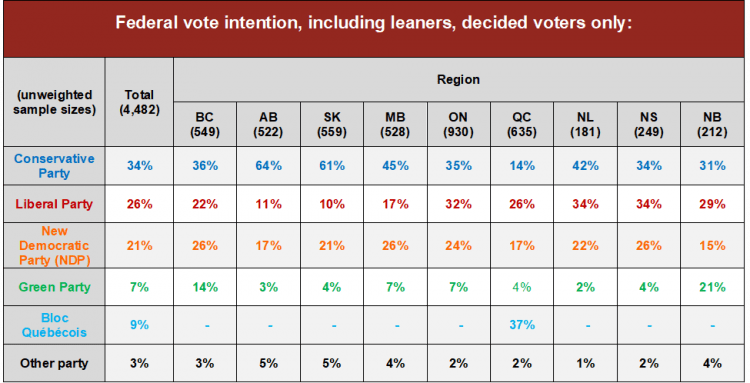
*Because its small population precludes drawing discrete samples over multiple waves, data on this question specific to Prince Edward Island is not released.
For detailed results by age, gender, region, education, and other demographics, click here.
To read the full report, including detailed tables and methodology, click here.
Click here to read the full questionnaire used in this report.
MEDIA CONTACTS:
Shachi Kurl, Executive Director: 604.908.1693 shachi.kurl@angusreid.org @shachikurl
Dave Korzinski, Research Director: 250.899.0821 dave.korzinski@angusreid.org


